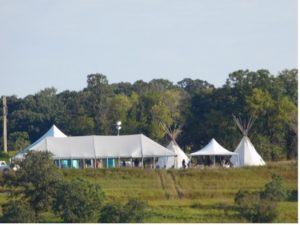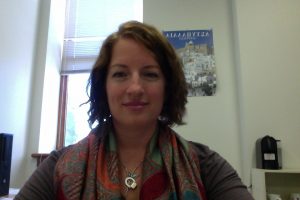In collaboration with Sioux Valley Dakota Nation (SVDN), researchers from Simon Fraser University, Brandon University and the University of Windsor are conducting an investigation to identify the children buried in unmarked graves at the Brandon Indian Residential School, in Manitoba.
 The Brandon Residential School Cemeteries Project intends to identify the names of children who died at school while it was in operation from 1895 to 1972. Using forensic methods coupled with archival research and interviews with survivors, the project team will reclaim the identities of children and work with affected communities and families.
The Brandon Residential School Cemeteries Project intends to identify the names of children who died at school while it was in operation from 1895 to 1972. Using forensic methods coupled with archival research and interviews with survivors, the project team will reclaim the identities of children and work with affected communities and families.
“This project is integral in raising awareness and reinforcing public education on the legacy of historical trauma of Indigenous people in Canada,” says Evelyn Pratt, Sioux Valley councilwoman. The SVDN continues to seek ways forward to identify and protect the site’s cemeteries. “The proper and respectful identification leading to the repatriation of the remains of those innocent lives lost will hopefully provide closure and healing for families.”
Project collaborators include SFU professor and project lead Eldon Yellowhorn; SFU PhD candidate Katherine Nichols; SFU faculty researchers Deanna Reder, Hugo Cardoso and Dongya Yang; University of Windsor professor John Albanese; Brandon University professor Emily Holland and student Darian Kennedy, and other student research assistants.
The collaborators share the sadness of the Tk’emlups te Secwépemc First Nation regarding the preliminary results of the investigation of the former Kamloops Indian Residential School. Those working on the Brandon project are aware that communities and families of missing children across the country are now being reminded of their losses once again. Now they must confront old questions regarding their children. Although their grief is private, they desire resolution.

Investigations into the cemeteries and unmarked graves at the Brandon school site began in 2012. Sioux Valley Dakota Nation Chief and Council and other landowners collaborated with Nichols, who at the time was a University of Manitoba master’s student. The results of Nichols’ thesis research found death records for 70 children but a site survey indicated additional unmarked graves, including some that were not in the cemetery.
The Brandon project team received funding in April 2019 from the Social Sciences and Humanities Research Council of Canada (SSHRC) to pursue the project but the work was interrupted by the pandemic. While the impact of COVID-19 has created challenges for the project and prevented community gatherings and ceremonies, collaborators plan to reach out to affected communities when everyone can meet safely.
“Despite the associated ethical, legal and logistical challenges, the Sioux Valley Dakota Nation is committed to ensuring that community-led research is grounded in culture, following the guidance of our Elders and is conducted in a holistic and ethical way,” says Chief Jennifer Bone, SVDN.
Following the wishes and requests of the respective communities involved, the plan is to restore the children’s identity, either through commemoration or repatriation.
“There is hurt and pain in our community today. However, I would like people to know that we are not powerless here. We have put together a world-class team of archaeologists, geneticists, physical and forensic anthropologists and archival researchers. Our team brings together the kind of expertise that is needed to remedy this situation,” says Eldon Yellowhorn, SFU’s founding chair of Indigenous Studies, and Nichols’ PhD supervisor.
Ultimately, the collaborators hope their efforts will provide a framework that can be adopted and applied by Indigenous communities, as a guide to initiate and proceed in their own process.
“Missing children and unmarked graves at residential schools are a forgotten human rights issue in Canada. Investigations at the Brandon Residential School seek to remove the anonymity of children’s deaths and provide answers to affected communities. By acknowledging and acting on important matters of social justice, we begin the work towards reconciliation in my home town,” says Nichols.

Holland says: “This project has the potential to facilitate reconciliation. At the core of our work is ensuring that we respectfully follow the desire of Sioux Valley Dakota Nation and associated Indigenous communities as to steps forward.”
“This project demonstrates the strength of partnerships between academic and Indigenous communities that follow evidence-based investigations of cemeteries associated with residential schools,” says Cardoso.
Albanese adds: “Through this partnership, we are creating a roadmap that can help Indigenous Communities across Canada to navigate a complex system to restore the identities of children who never had a chance to live their lives.”
“Ancient DNA analysis is a technique that can help to accurately identify children in cases of repatriation,” says Yang.
In a joint statement, the Sioux Valley Dakota Nation and the research team restates their recommendations to the Government of Canada about residential schools and related areas:
To implement the Truth and Reconciliation Commission of Canada Calls to Action, specifically actions pertaining to Missing Children and Burial Information (71-76)
- To fund long-term community health and trauma support
- To fund long-term community-based research across Canada
- To develop a centralized and public cemetery database and registry; and
- To enact legislation to protect all residential school cemeteries.
Please note that because of the sensitive nature of the issue and the pandemic shutdown, team members are not available to comment further at this time but will provide updates in the near future.
Watch the Sioux Valley Dakota Nation media statement: https://www.youtube.com/watch?v=5FlrT-upFo8
Learn more about the Sioux Valley Dakota Nation https://svdngovernance.com/
Contact
- Brandon University
- communications@brandonu.ca
To receive any BU publication in an alternate format please contact Communications@BrandonU.ca
About BU
Success is built at Brandon University. Our growing, progressive campus welcomes a diverse and inclusive community that combines proud tradition with shared ambition. Through our excellence in teaching, research, and scholarship, we educate students to make a meaningful difference as engaged citizens and leaders. Join us at BrandonU.ca.